Share
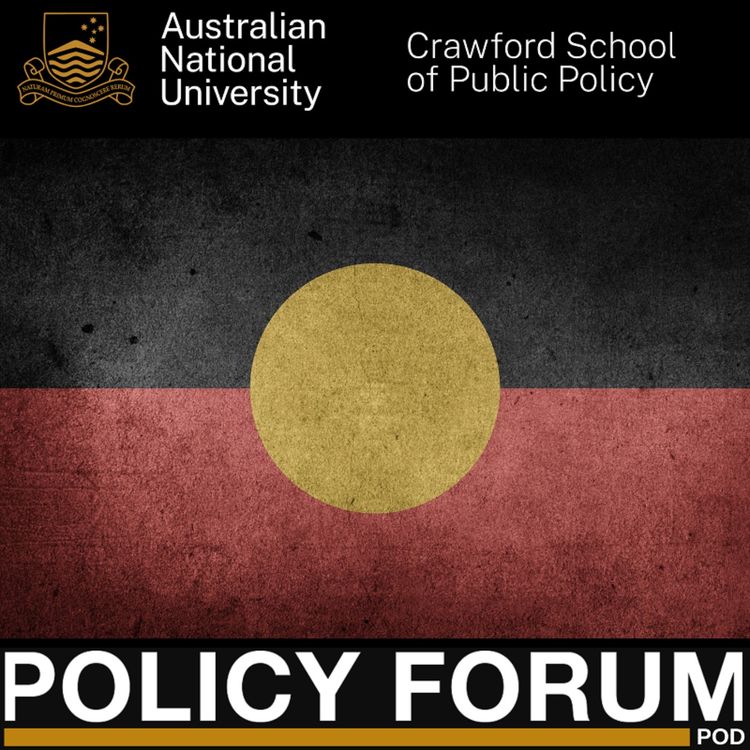
Policy Forum Pod
Courting change: Indigenous reconciliation
As we move towards the referendum on the Voice later this year, it is important that we think deeply about both our future and our past. We cannot do that unless we talk honestly about a history of dispossession and genocide. These are difficult and painful issues but are essential if we are to have genuine reconciliation between Indigenous and non-Indigenous Australians.
To begin the first of several conversations over the coming months, Sharon and Arnagretta are joined by Professor Kate Auty.
Professor Auty is a Vice Chancellor’s Fellow at the University of Melbourne and Chair of Victoria’s Environment Protection Authority. She has formerly held appointments as a magistrate in Victoria where she helped establish the Koori Court in Shepparton, and in the goldfields and western desert of Western Australia, establishing Aboriginal sentencing courts in consultation with Aboriginal people. Her latest book is O’Leary of the Underworld: The Untold Story of the Forrest River Massacre.
WARNING: Aboriginal and Torres Strait Islander viewers are warned that the following program contains discussion of deceased persons. This episode recounts some aspects of Australian history that are violent and some listeners may find disturbing.
More episodes
View all episodes
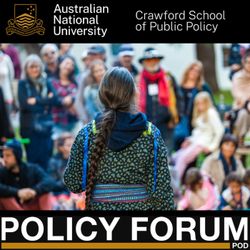
Care, connection and who decides
50:08|In this episode, we speak to the CEO of the Paul Ramsay Foundation, Professor Kristy Muir about care, connection and who decides in policymaking, especially around children.She discusses the life and death realities of social capital, the importance of a wellbeing framework and the challenges of a silo approach to making progress on societal issues. Professor Muir says we need to think long term to change society for the better.Professor Muir says we need to place greater importance on Indigenous knowledge, caring for Country and generational views and relationships. She also discusses what steps need to be taken now, after the Voice referendum, saying it is a long-term effort, and we need to keep doing the work. ___Professor Kristy Muir is the Chief Executive Officer of the Paul Ramsay Foundation, one of Australia’s largest and most influential philanthropic foundations. She is also a Professor of Social Policy at UNSW Sydney Business School. Sharon Bessell is a Professor of Public Policy and Director of both the Children’s Policy Centre and the Poverty and Inequality Research Centre at ANU Crawford School of Public Policy.Arnagretta Hunter is the Human Futures Fellow at ANU College of Health and Medicine, a cardiologist, a physician, and a Senior Clinical Lecturer at ANU Medical School.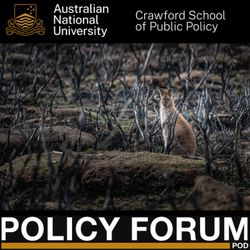
Our vulnerable environment with Sophie Lewis
42:19|In this episode we speak to Dr Sophie Lewis, the ACT Commissioner for Sustainability and the Environment. She discusses the key takeaways from the 2023 ACT State of the Environment Report, and how both individuals, industries and governments can make a difference.Dr Lewis talks about how we all need to think about the things we never get back unless action is taken. She says we need to limit urban growth, set a limit on what we are willing to lose within our environment, and further everyone’s understanding of Scope 3 emissions. She acknowledges the complexity and interconnectedness of issues around the environment and sustainability with broader climate change issues and the challenges this poses in making progress. __Dr Sophie Lewis is the ACT Commissioner for Sustainability and the Environment. Dr Lewis is a climate scientist, who was named ACT Scientist of the Year in 2019, in recognition of her research, particularly on weather extremes and how climate change contributes to events such as bushfires and droughts. She has also been a lead author of Intergovernmental Panel on Climate Change (IPCC) reports, which are used worldwide to develop policies around climate change. Sharon Bessell is a Professor of Public Policy and Director of both the Children’s Policy Centre and the Poverty and Inequality Research Centre at ANU Crawford School of Public Policy.Arnagretta Hunter is the Human Futures Fellow at ANU College of Health and Medicine, a cardiologist, a physician, and a Senior Clinical Lecturer at ANU Medical School.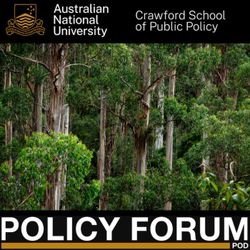
The Forest Wars: securing the future
44:46|Professor David Lindenmayer joins the podcast to discuss the importance of forests, the threats they are facing, and the myths around the logging industry.In his latest book, The Forest Wars: The ugly truth about what’s happening to our tall forests, Professor Lindenmayer unearths truths about what happens to forests that have been recently logged in a bushfire, how logging impacts native animals, and what happens to our native trees once they are logged. His research reveals uncomfortable truths about the profitability and employment outcomes of the forestry industry, and he says misinformation in these areas limits evidence-based policy reform.____ Professor David Lindenmayer AO is a world-leading expert in forest and woodland ecology, resource management, conservation science and biodiversity conservation. He is based at the Australian National University and is among the world’s most productive and highly cited scholars, publishing more than 1440 scientific articles and 48 books. Sharon Bessell is a Professor of Public Policy and Director of both the Children’s Policy Centre and the Poverty and Inequality Research Centre at ANU Crawford School of Public Policy.Arnagretta Hunter is the Human Futures Fellow at ANU College of Health and Medicine, a cardiologist, a physician, and a Senior Clinical Lecturer at ANU Medical School.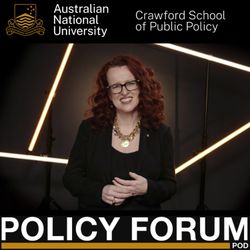
A conversation with ANU Vice-Chancellor Genevieve Bell
50:08|ANU Vice-Chancellor, Distinguished Professor Genevive Bell joins us to discuss the power of stories, knowledge and a vision for our future. Distinguished Professor Genevieve Bell is the 13th Vice-Chancellor of ANU. She is also the University’s first female Vice-Chancellor. She holds a PhD in cultural anthropology from Stanford University and is a renowned anthropologist, technologist, and futurist, having spent more than two decades in Silicon Valley helping guide Intel's product development and social science and design research capabilities.Sharon Bessell is a Professor of Public Policy and Director of both the Children’s Policy Centre and the Poverty and Inequality Research Centre at ANU Crawford School of Public Policy. Arnagretta Hunter is the Human Futures Fellow at ANU College of Health and Medicine, a cardiologist, a physician, and a Senior Clinical Lecturer at ANU Medical School.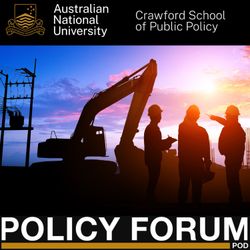
Building for social inclusion with Sara Bice
53:51|In this podcast we speak to Professor Sara Bice about the importance of building for social inclusion, co-design and community consultation as Australia spends $300 billion on infrastructure projects. Professor Bice co-founded the Institute for Infrastructure in Society to help better integrate social and community aspects. She says the best policy making occurs when there is a shared agreement on what the problem is, and the focus can then be on fixing that problem. ___Professor Sara Bice is co-founder and Director of the Institute for Infrastructure in Society (I2S) at ANU Crawford School of Public Policy. Sharon Bessell is a Professor of Public Policy and Director of both the Children’s Policy Centre and the Poverty and Inequality Research Centre at ANU Crawford School of Public Policy. Arnagretta Hunter is the Human Futures Fellow at ANU College of Health and Medicine, a cardiologist, physician, and a Senior Clinical Lecturer at ANU Medical School.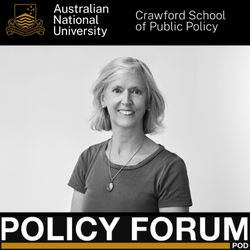
21st Century Capitalism - A tribute to Susan Sell
46:47|In this episode we pay tribute to Professor Susan Sell. Professor Sell died unexpectedly in December 2023. In re-releasing this conversation from August 2023 about 21st Century Capitalism, we honour her intellectual rigour and the enormous contribution of her research.Professor Sell’s work was theoretically ground-breaking and an exemplary example of the careful research that contributes to our understanding of the nature of power and what this means for societies, for equity and for justice.Those who knew Susan remember her as full of life, full of generosity and someone who genuinely cared and was a wonderful friend and colleague.Professor Susan Sell was based at the School of Regulation and Global Governance (RegNet) at the Australian National University. She previously held positions at a number of universities, including George Washington University in the United States and published widely on the global political economy and on 21st century capitalism. In 2015-2016 she was appointed to the Expert Advisory Group for the United Nations Secretary General’s High-level Panel on Public Health and Access to Medicines. Sharon Bessell is a Professor of Public Policy and Director of both the Children’s Policy Centre and the Poverty and Inequality Research Centre at ANU Crawford School of Public Policy. Arnagretta Hunter is the Human Futures Fellow at ANU College of Health and Medicine, a cardiologist, a physician, and a Senior Clinical Lecturer at ANU Medical School.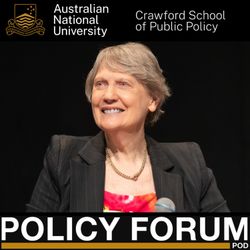
Politics, policy and a healthy human future with Helen Clark
01:09:13|On this special episode of Policy Forum Pod the Rt Hon Helen Clark, former Prime Minister of New Zealand and former UNDP Administrator, joins Professor Sharon Friel and Professor Bina d’Costa to discuss policy, politics and governing human future.This event was hosted by ANU College of Health and Medicine with the Australian Global Health Alliance. It was recorded live at The Australian National University and the conversation was facilitated by Dr Arnagretta Hunter.If this episode captured your interest, The Rt Hon Helen Clark will address the World Health Summit 2024 Regional Meeting 22-24 April, on Geopolitics and Health: Achieving Equity in a divided world. If you’d like to hear more on the intersection of health and geopolitics, visit www.whsmelbourne2024.com___Rt Hon Helen Clark is a respected global leader in sustainable development, gender equality and international co-operation, and served nine years as the first female Prime Minister of New Zealand. While in government, she led policy debate on a wide range of economic, social, environmental, and cultural issues, including sustainability and climate change. Sharon Friel is a Professor of Health Equity and an ARC Laureate Fellow in Planetary Health Equity at the ANU School of Regulation and Global Governance. Her research is focused on the intersection of social, commercial, political and environmental factors that contribute to health inequities and what changes policy and governance can make. Bina D'Costa is a Professor at the Department of International Relations, at ANU Coral Bell School of Asia-Pacific Affairs. Her research interests span migration and forced displacement; children and global protection systems; gender-based violence in conflicts; and human rights and impunity. Sharon Bessell is a Professor of Public Policy and Director of both the Children’s Policy Centre and the Poverty and Inequality Research Centre at ANU Crawford School of Public Policy.Arnagretta Hunter is the Human Futures Fellow at ANU College of Health and Medicine, a cardiologist, a physician, and a Senior Clinical Lecturer at ANU Medical School.
The public sector and public value
58:30|Professor Janine O’Flynn joins us for the first episode of Policy Forum Pod for 2024! In conversation, the Director of the Crawford School of Public Policy talks about the obligation and position of the school, and other universities, to exercise a ‘convening power' and bring together a range of different actors and views in our complex public policy systems. Professor O’Flynn also talks about the catalytic power of government and the opportunity to reimagine the story of the state through a framework of public value. Janine also speaks about the idea of humility and humble government, which listens to lived experience and equally valid expertise that exists outside of the system.___Professor Janine O’Flynn is the Director of the Crawford School of Public Policy. Her research interests are in public management, especially reform and relationships. Sharon Bessell is a Professor of Public Policy and Director of both the Children’s Policy Centre and the Poverty and Inequality Research Centre at ANU Crawford School of Public Policy.Arnagretta Hunter is the Human Futures Fellow at ANU College of Health and Medicine, a cardiologist, a physician, and a Senior Clinical Lecturer at ANU Medical School.You can find full show notes on the Crawford School of Public Policy LinkedIn account.
Reflecting on 2023 with John Falzon and Thomas Mayo
59:33|In the final episode for 2023 we speak to John Falzon and Thomas Mayo about the year that was. We reflect on the challenges that we have faced from the cost of living, the Voice to Parliament referendum, and discuss the latest industrial relations bill.---John Falzon is a sociologist, poet and social justice advocate and is a senior fellow at Per Capita and a visiting fellow at RegNet here at the ANU. He was CEO of the St Vincent de Paul Society from 2006 to 2018 and in 2015 received an Order of Australia Medal for services to the community through social welfare organisations. Thomas Mayo is a Kaurareg Aboriginal and Kalkalgal, Erubamle Torres Strait Islander man. He is the Assistant National Secretary of the Maritime Union of Australia. Thomas is a signatory of the Uluru Statement from the Heart and has been a leading advocate since its inception in May 2017. He is the author of six books, including the very beautiful Finding the Heart of the Nation and The Voice to Parliament Handbook, co-authored with Kerry O’Brien. Sharon Bessell is a Professor of Public Policy and Director of both the Children’s Policy Centre and the Poverty and Inequality Research Centre at ANU Crawford School of Public Policy.Arnagretta Hunter is the Human Futures Fellow at ANU College of Health and Medicine, a cardiologist, physician, and a Senior Clinical Lecturer at ANU Medical School.You can find full show notes on the Crawford School of Public Policy LinkedIn account.